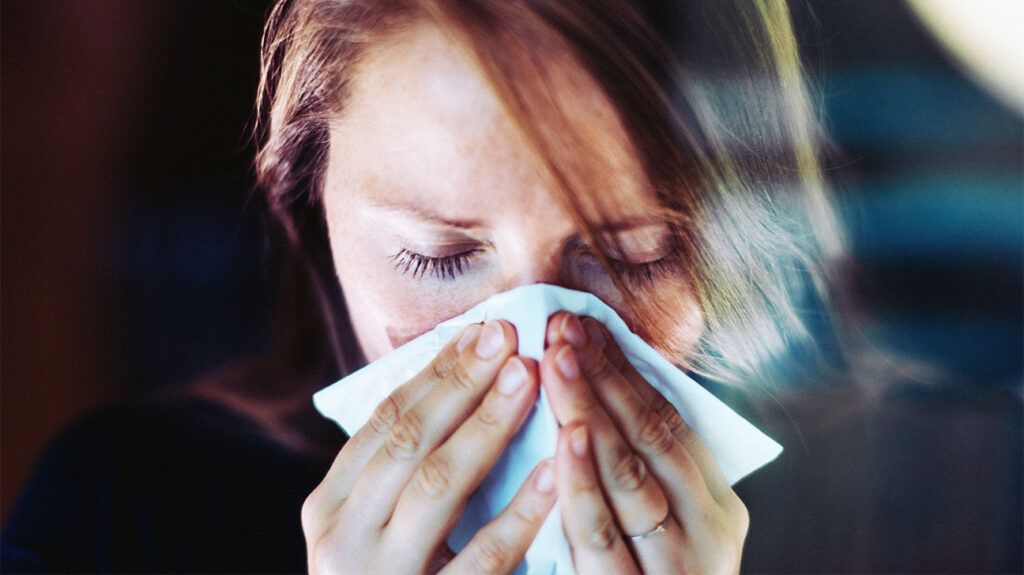Sneezing helps get rid of germs, irritants, and allergens from the nose. Hay fever, respiratory illnesses, and air pollutants may all cause sneezing.
Sneezing is a normal function of the body and usually not a cause for concern. It helps the body expel infections and irritants.
This article looks at different causes of sneezing, tips to relieve sneezing, treating underlying causes, and when to contact a doctor.

Sneezing is an involuntary reflex that removes irritants from the nose and can happen regularly. On average, a person who is not unwell sneezes about four times a day.
The area just inside the nostrils contains hair, which helps trap particles and prevent them from entering the body further. Sneezing helps the body expel irritants and germs from inside the nose.
A person may sneeze when an irritant enters the nasal passages. Sneezing can help to expel the irritant.
Looking at a sudden bright light can also cause a person to sneeze. This is called photic sneeze syndrome (PSS). People may also refer to PSS as autosomal dominant compelling helioopthalmic outburst (ACHOO) syndrome.
The exact cause of PSS
The following outlines some causes of excessive sneezing.
Allergies
Allergic rhinitis, or hay fever, can cause sneezing when the immune system overreacts to pollen from grass, weeds, or trees. The immune system can also react to other environmental triggers, such as:
- mold
- pet dander
- cockroaches
- dust mites
- irritants, such as cigarette smoke
People may experience symptoms of hay fever seasonally or throughout the year. Alongside sneezing, hay fever can also cause:
- runny nose
- stuffy nose
- itchy eyes, mouth, or skin
- poor sleep due to symptoms, which may cause fatigue
Infections
Some respiratory illnesses, such as the common cold, can cause sneezing. A cold is an infection of the nose and throat. Over 200 different viruses can cause a cold, but the most common is rhinovirus.
Symptoms of a cold may start developing 1 to 3 days after exposure to a cold virus, and include:
- sneezing
- runny nose
- stuffy nose
- sore throat
- cough
The influenza virus which causes flu can sometimes cause sneezing, but a cough, fever, and headache are more common symptoms.
It may be possible to stop sneezing by removing potential triggers, such as allergens, irritants, and pollutants. The following tips may help:
- avoid any known triggers where possible, such as pollen
- avoid irritants, such as cigarette smoke, and strong odors, such as perfumes, air fresheners, or strong cleaning products
- limit exposure to air pollutants, such as car exhaust
- clean thoroughly and regularly to remove dust, pet dander, and other irritants
- wash the hands after petting animals
- frequently use a hot wash to remove dust mites from bedding
- use an air filter to remove pollutants and allergens
- wear glasses or sunglasses outdoors to protect the eyes from pollen
- close the windows during high pollen counts
- use air conditioning in the car and at home
- avoid looking at bright lights if this causes sneezing, and shield the eyes from bright lights with sunglasses or a hat
- blow the nose to help remove irritants or allergens
- use a dehumidifier in the home to help control mold
If there is an underlying cause of sneezing, such as a cold or allergy, treatment may help to relieve sneezing and other symptoms.
If people are still experiencing allergy symptoms after avoiding triggers, medications may help reduce sneezing and ease symptoms such as nasal itching and congestion. This includes:
- corticosteroid nasal sprays, which are the most effective medication for treating hay fever and related nasal symptoms
- antihistamines, which target the chemical histamine, which is the main cause of allergic reaction symptoms
- immunotherapy, which helps the body develop a tolerance to allergens and reduce symptoms over time
A person can take certain medications, such as cromolyn sodium, before exposure to an allergen. Medications for non-allergic rhinitis are also available.
Treatments for a cold may help relieve sneezing and other symptoms and may include:
- acetaminophen
- nonsteroidal anti-inflammatory drugs (NSAIDs)
- decongestants
- antihistamines
- drinking plenty of fluids to help clear mucus from the nose and stay well hydrated
- avoiding caffeine and alcohol, as these are dehydrating
- avoiding cigarette smoke, which can cause further irritation
There is no standard treatment for photic sneezing, but reducing exposure to bright lights may help.
If home treatments for sneezing are not working, people may want to talk with a doctor to find out the underlying cause.
If people have severe allergies, a doctor may recommend prescription medications or immunotherapy treatments, such as allergy shots or sublingual tablets.
Why am I sneezing so much all of a sudden?
If people are suddenly sneezing a lot, it may be due to exposure to an irritant or pollutant. It may also mean people are developing a cold or other respiratory illness.
Frequent sneezing may indicate an allergy, such as pollen or dust allergy. An increase in allergens, such as high pollen counts, may cause an increase in symptoms, such as sneezing.
Is sneezing a symptom of COVID-19?
According to the National Institutes of Health (NIH), sneezing is rarely a symptom of COVID. Common symptoms of COVID-19 include:
- cough
- headache
- stuffy, runny nose
- sore throat
- fever
- aches and pains
- fatigue
- loss of taste or smell
Can you sneeze in your sleep?
Anecdotal sources suggest it may be possible to sneeze in lighter stages of sleep, but it is not possible to sneeze during cycles of rapid eye movement (REM) sleep.
Is it bad to hold in a sneeze?
It is best not to hold in a sneeze. Holding in a sneeze may increase the pressure in the airways by more than 20 times. This can potentially cause injuries to areas such as the throat, ears, or chest.
Can you sneeze with your eyes open?
It may be possible to sneeze with the eyes open, but as it is an involuntary reflex, the eyes may typically close with sneezing. There is nothing to suggest that sneezing with the eyes open is dangerous.
Does your heart stop when you sneeze?
The heart does not stop when you sneeze, but it may momentarily affect the heart rhythm. According to the University of Arkansas for Medical Sciences, sneezing increases pressure within the chest momentarily, which reduces blood flow to the heart.
To adapt to this, the heart briefly changes its regular heartbeat, but the heart’s electrical activity does not stop and is not a cause for concern.
Sneezing is an involuntary response to expel irritants, allergens, or infections from the nose.
Hay fever, colds, respiratory illnesses, and looking at bright lights may all cause sneezing.
People may be able to relieve sneezing by avoiding triggers and allergens and treating a cold with home remedies.
If people have severe symptoms or allergies that do not respond to home treatment, a doctor can check for underlying causes and recommend further treatment.


